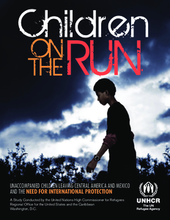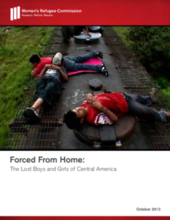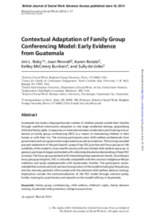This country page features an interactive, icon-based data dashboard providing a national-level overview of the status of children’s care and care reform efforts (a “Country Care Snapshot”), along with a list of resources and organizations in the country.
demographic_data
childrens_living_arrangement
children_living_without_bio
adoption
key_stakeholders
Key Stakeholders
Add New DataOther Relevant Reforms
Add New Datadrivers_of_institutionalisation
Drivers of Institutionaliziation
Add New Datakey_research_and_information
Key Data Sources
Add New DataPrevalence and number of children living in institutional care: global, regional, and country estimates
Reglamento de la Procuraduría de la Niñez y la Adolescencia de la Procuraduría General de la Nación
Revisión del gasto público asociado al cuidado de la niñez y adolescencia en Guatemala (2015 - 2019)
Acknowledgements
Data for this country care snapshot was contributed by a consultant with Maestral International and partners at Changing the Way We Care.
Displaying 131 - 140 of 150
This report is aimed at synthesizing key concepts and standards regarding the protection of the rights of migrant children and adolescents in the Northern Triangle of Central America.
Este informe está dirigido a sintetizar conceptos fundamentales y normas relativos a la protección de los derechos de los niños migrantes y adolescentes en el Triángulo Norte de Centroamérica.
This article discusses the challenges in protecting Guatemalan children and their families from involuntary separation and presents the process, results and implications of a pilot training in which Guatemalan participants from government and civil society explored the efficacy and feasibility of the FGC model in their country.
This article, produced by the BBC, reports on the growing number of unaccompanied children who immigrate to the United States from Mexico and Central America each year.
This article uses data collected from adoptive parents’ postadoption and governmental data in Romania, Ukraine, India, Guatemala, and Ethiopia to focus on domestic adoption in each of these countries. The article highlights both promising practices in domestic adoption as well as policies and practices that require additional research.
This report, issued by the United Nations High Commissioner for Refugees, examines the situation and needs of unaccompanied children who emigrate from Central America and Mexico to the United States, and offers recommendations based on those needs.
This petition was submitted to the Inter-American Commission of Human Rights (IACHR) by Disability Rights International and the Human Rights Office of the Arch-Bishop of Guatemala requesting precautionary measures, in accordance with article 25 of the IACHR rules of procedure, on behalf 334 children and adults with disabilities detained at the National Mental Health Hospital in Guatemala City (“Federico Mora” hospital). The petition documents the serious risks of physical and psychological harm of those detained at Federico Mora.
This report from the Women’s Refugee Commission describes the recent increase in migration of unaccompanied children from Central America to the United States and provides an overview of the situation of these children, including the factors that motivate their migration - primarily the violence they experience in their home countries.
Helping families and their kin develop care plans for orphaned and vulnerable children was the objective of the family group conferencing (FGC) training that took place in Guatemala City from July 10-12, 2012. This family preservation approach for developing strategies to prevent the institutionalization of children emphasizes the strengths of families and their capacity to solve their own problems and develop their own care plans.
This paper examines the relationship between migration and child growth in the rural highlands of Guatemala, a region with substantial international migration outflows, significant remittance inflows, and some of the highest rates of child undernutrition in the world.






